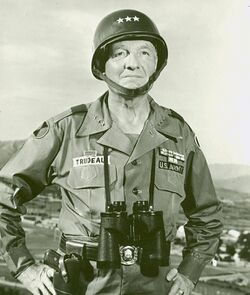Biography:Arthur Trudeau
Arthur Trudeau | |
|---|---|
 Trudeau in OG-107 uniform | |
| Born | Middlebury, Vermont, U.S. |
| Died | May 5, 1991 (aged 88) Chevy Chase, Maryland, U.S. |
| Buried | Arlington National Cemetery, Arlington County, Virginia, U.S.[1] |
| Allegiance | United States |
| Service/ | United States Army |
| Years of service | 1920–1962 |
| Rank | Lieutenant General |
| Commands held | I Corps Chief of Army intelligence 7th Infantry Division |
| Battles/wars | World War II
Korean War
|
| Awards | Army Distinguished Service Medal (3) Silver Star (2) Legion of Merit Bronze Star Medal |
| Other work | President, Gulf Research Development Company |
Arthur Gilbert Trudeau (July 5, 1902 – June 5, 1991) was a lieutenant general in the United States Army. He is best known for his command of the 7th Infantry Division during the Battle of Pork Chop Hill in the Korean War.
Early life and education
File:1958-02-06 Atomic Weapons come to Korea.ogv Trudeau was born in Middlebury, Vermont,[2] and entered West Point in 1920. He graduated in the Class of 1924 and later served in the 104th Engineers of the New Jersey National Guard.
Career
In 1944, Trudeau was promoted to brigadier general. Considered a specialist in amphibious warfare as the prior chief of staff of the Engineer Amphibian Command,[3] he assumed command of a secret base in the Philippines in 1945, assisting in the preparation for an invasion of Japan that never eventuated.
In January 1946, Trudeau was appointed as a judge at the Military Tribunal of Gen. Masaharu Homma in view of the war crimes committed by his command during the invasion of the Philippines, sitting on the bench along with MGen. Leo Donovan, MGen. Basilio Valdes, BGen. Robert G. Gard, and BGen. Warren H. McNaught.[4][5]
After the war, he served in Germany, before becoming deputy commander of the United States Army War College in 1950.[6]
During the Korean War, Trudeau commanded the 7th Infantry Division. He received the Silver Star by personally leading a reconnaissance team to scout a strategic position, Pork Chop Hill, while it was under heavy enemy fire. He was named Chief of Army intelligence in October 1953, but was relieved of his command 20 months later when Allen W. Dulles, Director of Central Intelligence, sent a scathing memorandum of complaints to the Pentagon. Although the contents of the memorandum were not made public, Trudeau was noted for his vigorous anti-Communist statements, and he often clashed with other government officials over their differing views of communist intentions. He returned to Korea to take command of I Corps.[7] On October 18, 1956, Trudeau was promoted to lieutenant general.[8] In 1958, he returned to Washington as Director of Army Research and Development.[7]
Later life and death
Upon retirement from the army in 1962, Trudeau went on to head Gulf Labs of the Gulf Oil Corporation in Pittsburgh until 1968. He then served as a special adviser to the chairman of Pittsburgh's Rockwell International aerospace firm until 1972.
Throughout his military service, Trudeau was an outspoken advocate of racial integration of the military. He also said it was in the nation's best interests that educational opportunities be provided for the disadvantaged so they could take advantage of new career openings. Trudeau is a member of the Military Intelligence Hall of Fame.
Trudeau died on May 5, 1991, in Chevy Chase, Maryland.
References
- ↑ Arthur Trudeau at Find a Grave
- ↑ "Middlebury, Vermont". City-Data.com. http://www.city-data.com/city/Middlebury-Vermont.html.
- ↑ Coll, Blanche D.; Keith, Jean E.; Rosenthal, Herbert H. (1958). The Corps of Engineers: Troops and Equipment. Washington, DC: Office of the Chief of Military History, Department of the Army. pp. 361–362. OCLC 934025581. https://history.army.mil/catalog/pubs/10/10-4.html. Retrieved 31 January 2020.
- ↑ Sides, Hampton. "The Trial Of General Homma". American Heritage. https://www.americanheritage.com/trial-general-homma.
- ↑ "United States of America vs Masaharu Homma". International Criminal Court. https://www.legal-tools.org/doc/e7494b/pdf.
- ↑ Arthur G. Trudeau, Lieutenant General, United States Army
- ↑ 7.0 7.1 Lieut. Gen. Arthur Trudeau, 88, Retired Chief of Research in Army – New York Times
- ↑ Engineer Memoirs, Lieut. Gen. Arthur Trudeau - USACE Publications
External links
- U.S. Army biography of General Trudeau both in service and private sectors
- Lieutenant General Arthur G. Trudeau Interview Table of Contents
- Arthur Trudeau's FBI files, hosted at the Internet Archive:
- Arthur Trudeau at Find a Grave
- Generals of World War II

